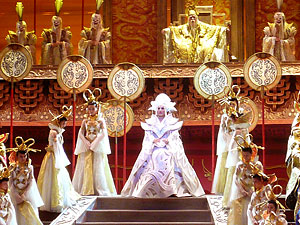中國作曲家郝維亞為普契尼未完成的《杜蘭朵公主》寫了一個十八分鐘的結尾。這個「新」作品在今年三月做為北京國家大劇院的開幕戲碼。《杜蘭朵公主》是少數以中國作為背景的西方歌劇之一,訴說一個專橫的公主砍下那些失敗的追求者的項上人頭,最後愛上異國王子卡拉夫。或許是因為政治的因素,這部歌劇有近七十年的時間未能在中國演出。如今這部歌劇有這樣的露出機會,並且有了一個新的結局(之前有兩個作曲家為這部歌劇寫了結尾),可以想見中國把這個演出場地當作一個表現國家的舞台。
郝維亞是受國家大劇院所委託寫下這個結尾。三十六歲的他曾在義大利學歌劇。他在六個星期內寫下這十八分鐘的結尾,也受義大利的普契尼基金會的幫助修改了七次。在中國,他的新作備受好評。但是對整個歌劇的圈子而言,這個新的結尾表現出中國如何應對、理解及表現西方文化。對很多歌劇評論家而言,在這個結尾中感受到的是一些些的現代感、一些些的傳統中國文化、一些些的粗俗、一些些的商業化、一些些的試著努力。但是整體而言是不連貫的。中國還沒找到文化主體,不管是中國本身,還是西方文化。
但是這個嘗試是值得記點的。在沒有西方歌劇傳統的背景下能夠有這樣大膽且豐富的演出,雖然演出作品離世界一流還有些距離,但是可以看出中國對文化有世界一流的野心。
**照片來源:Louisa Lim, NPR
Chinese composer Hao Weiya wrote a new ending for Turantot, a scheduled opera to inaugurate the National Center for Performing Arts in Beijing this March. Turandot tells a story of a tyrannical princess, Turandot, who has her numerous failed suitors beheaded, and falls in love with an unknown prince, Calàf. This unfinished work by Giacomo Puccini was completed by Franco Alfano. Perhaps it was because the political difficulty, this opera wasn’t performed in China for nearly seventy years, until 1998 in the Forbidden Palace. We can sense that choosing this opera to be performed in such an occasion is an attempt to present China herself.
Hao Weiya wrote this eighteen-minute new ending while studying opera in Italy. He wrote it in just six weeks and revised seven times with help from Puccini Foundation in Italy. In China, the new ending receives consentaneous approval. However, opera critic Andrew Moravcsik remarks more with a cultural perspective. "There's a little bit in it that's modern, a little bit that seems traditionally Chinese, a little bit that's glitzy, a little bit that's commercial, and a little bit that's sincere. But in the end, it isn't coherent. That's very much like China is today. It's on its way to finding a coherent identity, but it hasn't found it yet.”
I would also agree with Moravcsik’s point that this new attempt presents a sophisticated and audacious production, especially for a country like China, with no tradition of Western opera. Even though the work still has a long way to catch up as a world-class production, we cannot deny that China indeed has the world-class ambition in culture.
**Photo source:Louisa Lim, NPR
***Moravcsik’s critic, All Things Considered, NPR, April 29, 2008


 字體:小 中 大
字體:小 中 大









